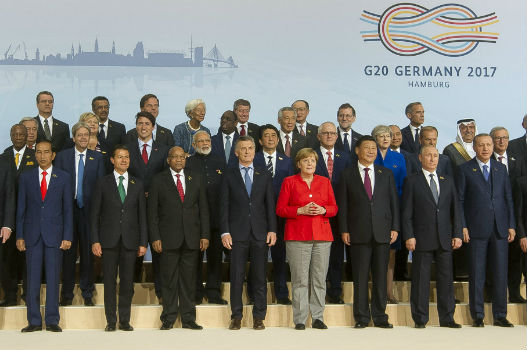Over the past three years, as thousands of refugees drowned off Europe’s coasts, Germany’s open-door policy towards asylum seekers propelled the country to a position of global humanitarian leadership, and turned its chancellor, Angela Merkel, into a global icon for human rights advocates. As of 2016, the nation of 82.5 million absorbed 890,000 refugees, and a majority of the German population has warmly supported the influx of foreigners. However, the Berlin Christmas attack by a rejected asylum seeker, and the 1,200 sexual assaults reported in numerous German cities over New Year in 2016 (allegedly perpetrated by immigrants of North African descent), has sparked widespread outrage fueling debate to reduce the number of refugees granted asylum. Facing a competitive reelection race in September, Merkel has responded to public pressure on the migration question without surrendering Germany’s moral and thought leadership on the issue.
The Compact with Africa (CwA) has emerged from these competing political pressures, and capitalizes on Germany’s current presidency of the Group of 20 (G20), which is focused on Africa.
In January, Germany launched the blueprint for a “Marshall Plan with Africa.” Several months later, the CwA was officially launched by Merkel in Baden-Baden, Germany, with guests including the heads of state from Côte d’Ivoire, Morocco, Rwanda, Senegal, Tunisia, Ghana, and Ethiopia. As one of the core projects of Germany’s G20 presidency, the CwA’s objective is to prepare “comprehensive, coordinated, and country-specific Investment Compacts” that will use partnerships among the G20 countries, African governments, International Financial Institutions, and private investors to promote economic reform and make countries more attractive to future investment.
The CwA is designed to slow migration from Africa by improving the business environment, increasing the in-flow of private investment to the continent, and jumpstarting African economies. Like the United States’ Millennium Challenge Corporation (MCC), the CwA is aimed at rewarding high-performers by using a competitive process to grant development support to countries that have already met certain economic and governance benchmarks. Unlike the MCC, however, the CwA is focused exclusively on Africa. Another important difference is that, while MCC compacts are essentially apolitical – awarded on the basis of merit, not on the strategic relevance of the recipient country – the CwA is explicitly linked to German national security objectives, and targets the countries that are most relevant to Germany’s strategic interests.
Thus far, Germany has pledged 300 million Euros starting in 2017 to three CwA recipients: Ghana, Tunisia, and Cote d’Ivoire. (Senegal, Morocco, and Rwanda were also signed onto the Compact, but not selected as beneficiaries.) What sets apart Ghana, Tunisia, and Côte d’Ivoire as candidates for reform is not only their domestic policies that “have a strong focus on transparent budgets, fighting corruption, promoting democracy and realizing economic reform,” but the nations’ importance to Germany.
Historically, Ghana has been Germany’s third largest trading partner in Sub-Saharan Africa and has received an aggregate of 1.37 billion Euros in bilateral development from 1961 to 2015. Ghana’s economic policies and programs currently continue to yield a positive indication of 6.6 percent gross domestic product growth for the first quarter of 2017. Similarly, Côte d’Ivoire was the fastest growing African economy in 2016, making these two countries attractive destinations for future foreign investments in West Africa (they could also, potentially, become attractive alternative destinations for refugees who might otherwise attempt to reach Europe). Tunisia, on the other hand, is emerging as a democracy in the aftermath of the Arab Spring, and its struggling government is the West’s ally in the fight against terrorism. In early 2017, Germany signed a deal with Tunisia giving 250 million Euros in support of development projects, in return for Tunisia’s pledge to speed the repatriation of rejected Tunisian asylum seekers from Germany.
Merkel has been clear that the CwA is part of a broader effort by Germany, and Europe, to reduce the number of refugees pouring out of Africa. During remarks at a G20 preparatory event, she said, “If there’s too much hopelessness in Africa, of course there will be young people who say they need to find a life elsewhere in the world. By cooperating with those countries, we are also creating more security again for ourselves.”
This is a laudable goal, but it faces several obstacles. The G20 presidency only lasts a year, Germany’s long-term commitment to the initiative may not survive, particularly if Merkel loses the upcoming election. Germany, moreover, is not rich enough to boost African economies on its own, so the program’s success will depend in large part on whether Germany succeeds in bringing the other G20 nations on board. (Argentina, which has the next rotation of the G20 presidency, is in talks with Germany to continue with the CwA, but this has not been confirmed). Critics of the Compact also argue that until average per capita income within Sub-Saharan African countries rises dramatically, from the current $1,594 to $7,000-$9,000, the rate of migration to Europe will not decrease. And if rates of migration remain at crisis levels, Germany – and the rest of the European governments – may fail to see the benefit of pouring more aid money into Africa.
Xaviera Gitau was an intern with the Atlantic Council’s Africa Center.
Image: German Chancellor Angela Merkel is pictured with world leaders from the G20 Summit in Hamburg on July 7, 2017. Africa has remained a top priority for Germany during its G20 Presidency, as demonstrated by the launch of the Compact with Africa, which seeks to create a stable environment for increased investment to the continent. Photo credit: GCIS.
